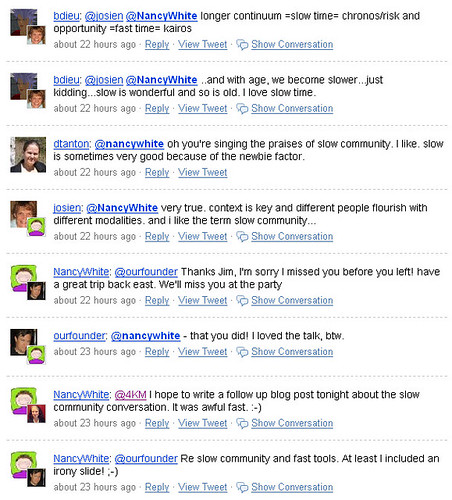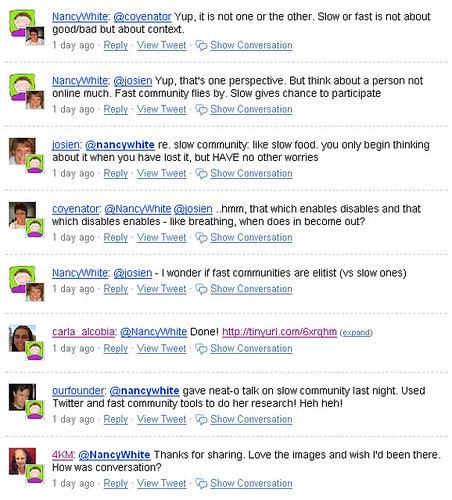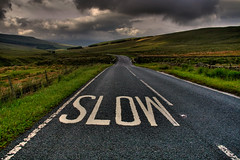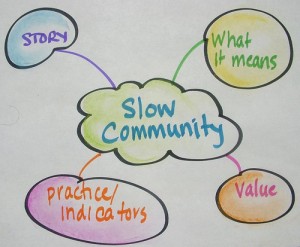 I promised earlier this week that I would post a follow up about my offering Tuesday night on Thinking about “Slow Community” (particularly online). Before it all (slowly) leaks out of my brain, here are some notes, comments and pointers to the ongoing Twitter conversation about “slow community.”
I promised earlier this week that I would post a follow up about my offering Tuesday night on Thinking about “Slow Community” (particularly online). Before it all (slowly) leaks out of my brain, here are some notes, comments and pointers to the ongoing Twitter conversation about “slow community.”
First, the host of the evening, Ryan Turner, wrote:
Nancy,
You ROCKED it last night. I knew you would. Thanks so much for making the time.
I think your talk pretty much blew everyone’s mind. It certainly got mine spinning, and I really think you’re on to something with the slow community idea. I too question whether it’s really slower or actually less–and I also wonder whether there’s a combination of those that ends up making sense. Do we partition our relationships? Our conversations (across relationships)? How do we manage work, where project groups form, dissolve, and re-form, but relationships (personal, intellectual, thematic) persist? Doesn’t seem to me anybody’s yet invented the social router, which could manage our cross-channel traffic in meaningful ways … though I do have some ideas … not to say a prototype ….
It was great to reconnect with you, just a bit, and I hope we can continue.
Best,
Ryan
Phew. And here I thought I was babbling and incoherent. 🙂 Thank goodness the other folks were all interesting. I enjoyed the offerings from Brian Fling of Flingmedia – Brian, did you talk about slow community at FOO Camp?; Justin Marshall of ZAAZ, Samantha Starmer from REI – Samantha, I have added “metadata strategy” to my online interaction checklist!; and Wendy Chisholm, who has opened my eyes to accessibility – even on a little old blog post – in a way that I needed. Thanks, Wendy!,
After the talks, I had the chance to have conversation with a few folks – unfortunately I did not write down names. I should have. Oi. Here are the points that came up that I can remember.
- If everything is so overwhelming and fragmented, what are the solutions? (The young guy who loved the chicken wings). I started to babble about a systems approach, but I need to actually understand better what that means. But I SENSE that this is important. True to my style, it usually takes me a while to figure out intellectually what I intuit.
- What is the role of information FLOW in creating a useful community experience, rather than overwhelm (the guy from Boeing).
- What is it we are really asking about – slowness, volume, simplicity?
- What should businesses be thinking about if they are in this crushing phase of “must have community?”
- What is the role of identity in all of this?
- And of course, Ryan’s “social router” which has MY head spinning.
On the Twitter front, besides the tweets already posted on the wiki, here is the latest round… thank you my TweetFriends. Oops, can’t do a screen capture. Since Windows did its last update, some of my old programs aren’t working. I was wondering when this was going to happen. Grrr. I’ll come back and edit it in. In the meantime, you can see them on Summize. I’ll go download Snagit and be right back!
(Later… here are the screen captures of the Tweets)



 Will Richardson and Sheryl Nussbaum have taken the slow community idea and pulled it back to the individual participation perspective. I had been thinking about how a community makes choices, as a whole, about it’s speed or flow, but this reminds me that the cumulative impact of individual member choices also impacts the community speed (or slowness.) And that ignoring the choices also has an effect.
Will Richardson and Sheryl Nussbaum have taken the slow community idea and pulled it back to the individual participation perspective. I had been thinking about how a community makes choices, as a whole, about it’s speed or flow, but this reminds me that the cumulative impact of individual member choices also impacts the community speed (or slowness.) And that ignoring the choices also has an effect. We missed our partner in crime – er- podcasting,
We missed our partner in crime – er- podcasting,  I promised earlier this week that I would post a follow up about my offering Tuesday night on
I promised earlier this week that I would post a follow up about my offering Tuesday night on 



